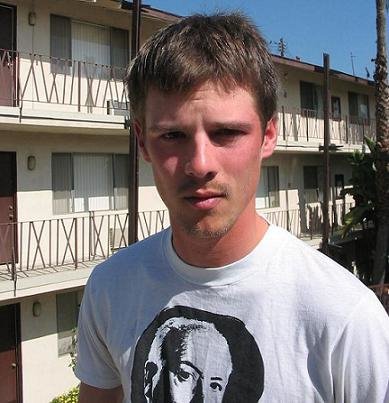Director: Mamoru Oshii
Starring: Akio Ôtsuka, Atsuko Tanaka, Kôichi Yamadera & Tamio Ôki
* * *
Picture an animated version of
Bladerunner as directed by Andrei Tarkovsky, and you'll get a good idea of the pacing, tone and plot of this sequel to Oshii's
Ghost in the Shell. The story involves a new series of robots that are loose on the street and kill their owners and its up to a grizzled, depressed cyborg to solve the case. Sound familiar?
Not only does the plot bear a more-than-passing resemblance to
Bladerunner, the production design looks familiar as well. While the animation is typical to what can be seen in the first
Ghost in the Shell, the frames are just as full and atmospheric as the best live-action film.
.jpg)
The aesthetic in Innocence can only be described as stylized retrofuturistic decay.
Innocence is thematically similar to
Bladerunner, too. It examines the sometimes imperceivable difference between organic and inorganic or specifically between the puppet and the puppeteer. How mechanical enhancements can human beings add to themselves before they become machines? Is there a difference?
The primary differences between the films are in the extremes. Whereas
Bladerunner also incorporated pets into its examination of Replicant/human,
Innocence expands this notion of organic-emulation to transportation machinery with planes that have metal "feathers" and wings that flap or submarines whose propulsion is similar to that of a whale swishing its tail.
Innocence's city is dirtier and more futuristic than Ridley Scott's Los Angeles.
Innocence's violence is more violent. Its slow moments are more pensive. This is where the Tarkovsky comparison comes in.
.jpg)
Has robotic noir become a genre?
Characters in
Innocence tend to quote philosophers with every other phrase they utter. They spend long, still, existential moments examining the nature of their realities with one another between bloody gunfights. It's as if Oshii presents us with the extremes and thinks,
they should find something to take away from all this! Certainly, there are many interesting bits of philosopy brought up in the film, but it's nothing one can't gain (or hasn't gained) from reading Descartes's
Meditations on First Philosophy. The film's slow pace lends a mechanical feel to the whole affair, but complaining about this choice misses the point of the film.
.jpg)
Here's the aftermath of a shootout and another example of Innocence's busy frames.
Try not to watch the film as an intellectual meditation. It feels like being in a room with sophisticated English gentlemen smoking pipes and playing chess in a tastefully lavish while they spew quotations from first period philosophy. At first your distinguished company and elegant surroundings will impress you. Eventually, though, you'll start to listen to the conversation, and you'll start to think,
shouldn't these guys be smarter than me...?
February 7
apartment computer, late night
* * *
D
.jpg)
.jpg)
.jpg)

